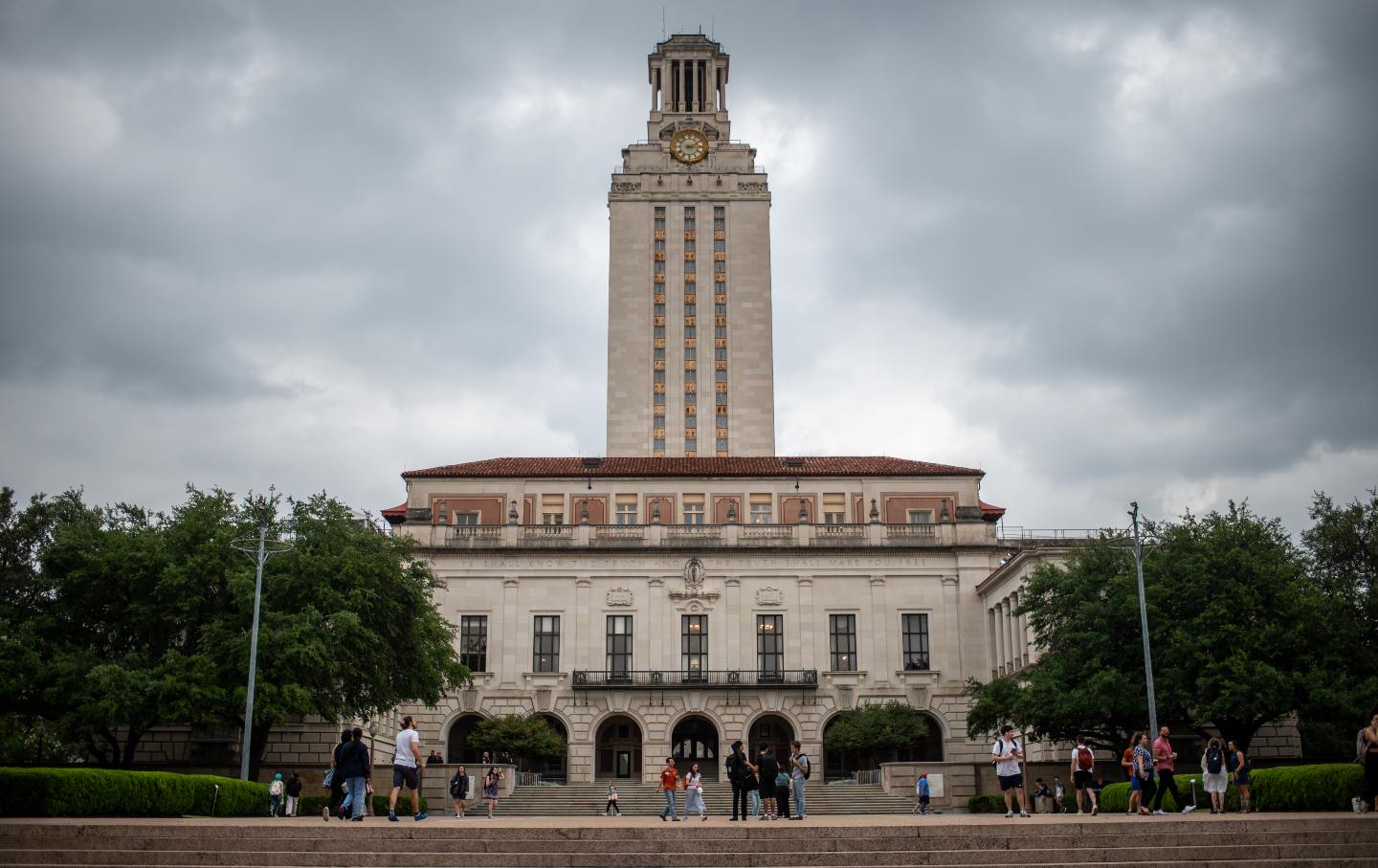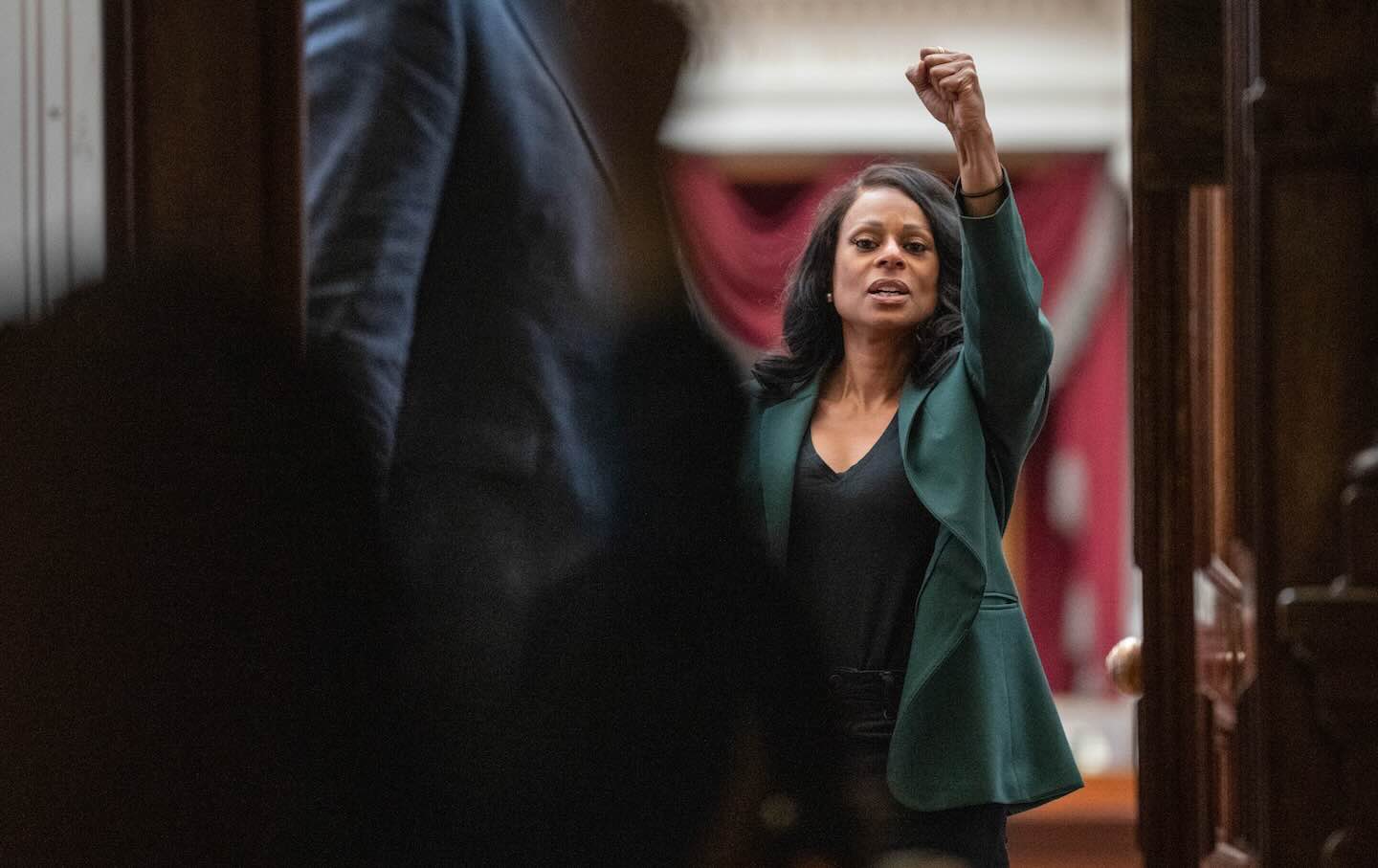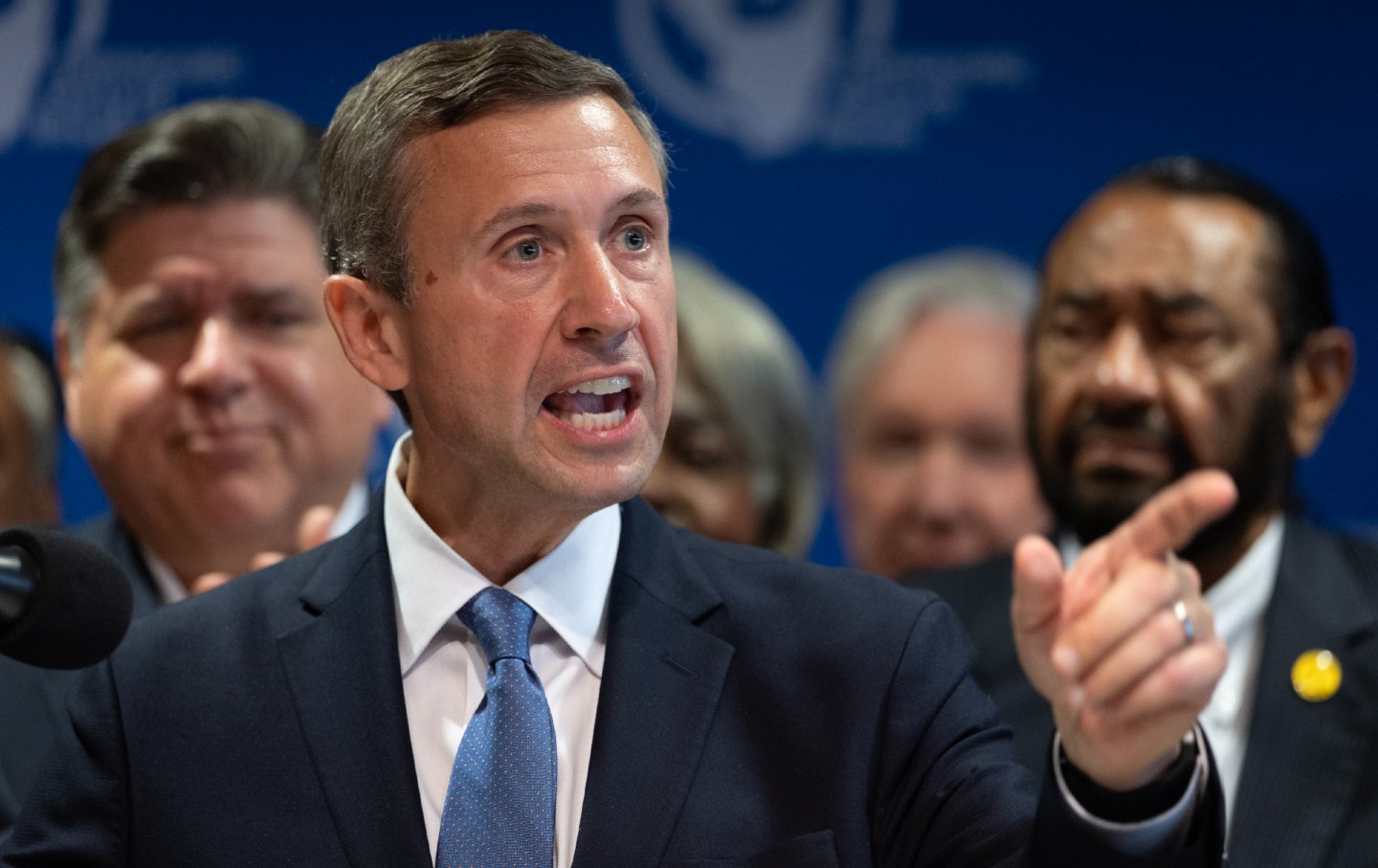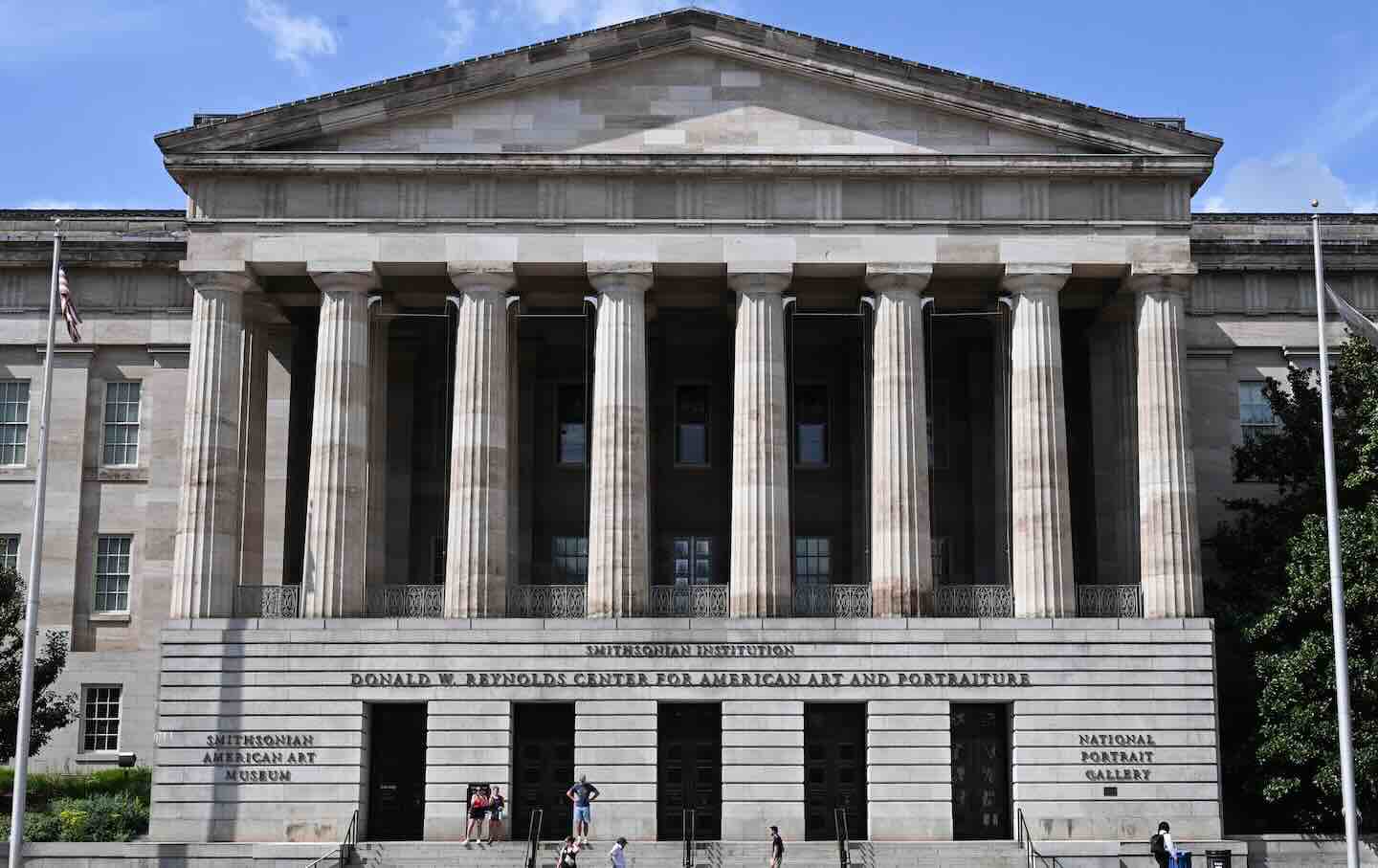Texas Ended In-State Tuition for Undocumented Immigrants. Students Are Already Feeling the Impact.
“The message is loud and clear: You’re good enough to pick vegetables or clean hotel rooms, but not to go to college.”

The tower at the University of Texas in April 2024 in Austin.
(Sergio Flores / Getty)Until June, Texas was one of the best states in the country when it came to offering in-state tuition to undocumented students. But after the Department of Justice filed a lawsuit against the state, officials quietly ended the policy.
The suit claimed that Texas violated a 1996 federal law that prohibits undocumented students from receiving residency-based tuition benefits unless those benefits are also extended to all US citizens—regardless of where they live. Rather than fight the lawsuit, Texas officials capitulated almost immediately. “They only deliberated for 30 minutes, and then they settled,” said Abraham Espinosa, director of access to higher education at FIEL Houston, an immigrant and civil rights organization in Texas with programs supporting undocumented students.
The policy, originally passed in 2001 as House Bill 1403, had allowed undocumented students who lived in Texas and graduated from a Texas high school to pay in-state tuition at public colleges and universities. Known informally as the Texas Dream Act, it opened the doors to higher education for tens of thousands of young people who had grown up in the state but were barred from federal financial aid and most scholarships.
The sudden reversal came after several attempts by the Texas Legislature to repeal the bills. “FIEL staff have been at the capitol every session since 2011 fighting to protect in-state tuition,” Espinosa said. “We beat it again this year. But two days later, we were blindsided.” Now, Espinosa’s inbox is full of messages from undocumented students and families asking: What does this mean for me?
Undocumented students and DACA recipients can still apply for state aid in Texas through the Texas Application for State Financial Aid, such as the Texas Grant—which, unlike loans, don’t have to be repaid. But TASFA was already limited, paying at most around $8,000 per year. That is barely enough to cover in-state tuition, and now that undocumented students must pay out-of-state rates, it won’t even come close. “TASFA remains the same,” said Espinosa. “The lawsuit only applies to the in-state tuition provision of HB 1403. So they technically can still receive financial aid but still have to pay out-of-state fees.” That distinction makes college all but inaccessible for many. “Now it’s even more of a financial burden because it will hardly cover anything,” Espinosa said. “They’ll still need to find aid elsewhere or either transfer or lower their credit hours. But lowering credit hours affects their eligibility for aid, because to qualify, they must be enrolled full time. So this is where we are now.”
Students are now making hard choices. Ximena, 18, recently graduated from a high school in Houston and had planned to attend the University of Texas at Tyler. A scholarship from the Honors Program, supportive professors, and a strong chemistry department made it her top choice. But with tuition already around $9,000 per semester before aid was processed—and out-of-state status looming—she withdrew. “I didn’t even want to see what it would be with out-of-state tuition,” she said. “It was already pretty high when I was still considered in-state. I just didn’t want to find out what that number would turn into.”
Instead, Ximena enrolled at Houston Community College. Credit-by-exam work she completed in high school helped lower her bill to $800, but that’s still three times what in-district students pay. “They quoted me $4,000 at first,” she said. “Even now, it’s a lot. And what I think is affordable could be something that’s just inconceivable for other families.”
Ximena came to the United States on a tourist visa in middle school to escape violence in her hometown in Mexico. “Most of my memories, my socialization, my education, that all happened here,” she said. “I’ve done basically all of my schooling in Texas.” What struck her most, she said, was how quietly the change happened. “I saw maybe a 10-second segment on the news,” she said. “Even the HCC staff didn’t really have resources or information. That was concerning to me, but also it made me think, what kind of support are schools being given to navigate this? It felt like we were supposed to find out on our own.”
She says most of her peers aren’t dealing with the same immigration status, but they are still feeling the broader effects of instability in higher education. “I’m seeing people online who had a dream school and got a considerable amount of aid, and now they’re getting rescinded or dropped or delayed. Some of them can’t even enroll,” Ximena said. She still hopes to transfer to the University of Houston and major in chemistry.
Axel, 25, is in his final year at the University of St. Thomas in Texas. He came to the state from San Luis Potosí, Mexico, when he was three and has lived in Houston ever since. He’s a DACA recipient, meaning he has a work permit and a Social Security number, but none of the federal financial aid that citizens can access. He’s studying studio art with a focus on photography and videography. But the rising cost of tuition threatens to cut his final year short. “I’ve always had to take part-time classes because my financial aid never covers them all,” he said. “I still end up paying $500 to $1,000 out-of-pocket every semester. Sometimes more.”
He described feeling stuck between financial aid that doesn’t go far enough and student loans he doesn’t qualify for. “I can’t take out federal or private student loans through the school,” Axel said. “I could try for a personal loan from a private company, but those are hard to get approved for and the amounts are low. Even if I get one, it might only help a little.”
Axel said he filled out TASFA with help from local groups like FIEL Houston and Café College but still found himself scrambling. “Every time I apply, they ask for everything, income, household size, how long I’ve been here. But even when I get aid, it’s never enough,” he said. “I usually have to go around asking people for help, or see if anyone knows about extra scholarships.”
Popular
“swipe left below to view more authors”Swipe →As of late July, he hadn’t heard anything from St. Thomas about how they planned to handle the change. “They haven’t said anything—no message, no email,” he said. “I’m kind of flying blind. I was planning to go today to ask about it, but it’s always stressful. I never know what the number’s going to be.” He said he was supposed to graduate next year, but now, he’s not sure. “I just don’t know if I’m going to be able to go back,” he said. “That’s where I’m at.”
Espinosa said the effects have already reached his own family. His sister, who holds a bachelor’s degree, had planned to apply to graduate school. “But she pulled back when this happened,” he said. “She looked at the numbers and just didn’t think it was worth it anymore.” And for students just starting out, the new reality could mean leaving school altogether. “We’ve had students say they’re going to quit,” Espinosa said. “And that’s exactly what the state wants.”
Espinosa emphasized that being undocumented is a civil, not criminal, offense. “It’s not illegal to be here. It’s just that the system doesn’t allow our community to thrive,” he said. “The message is loud and clear: You’re good enough to pick vegetables or clean hotel rooms, but not to go to college.”
“This is about who we think deserves to succeed,” Espinosa said. “And right now, the message from the state is: not you.”
Take a stand against Trump and support The Nation!
In this moment of crisis, we need a unified, progressive opposition to Donald Trump.
We’re starting to see one take shape in the streets and at ballot boxes across the country: from New York City mayoral candidate Zohran Mamdani’s campaign focused on affordability, to communities protecting their neighbors from ICE, to the senators opposing arms shipments to Israel.
The Democratic Party has an urgent choice to make: Will it embrace a politics that is principled and popular, or will it continue to insist on losing elections with the out-of-touch elites and consultants that got us here?
At The Nation, we know which side we’re on. Every day, we make the case for a more democratic and equal world by championing progressive leaders, lifting up movements fighting for justice, and exposing the oligarchs and corporations profiting at the expense of us all. Our independent journalism informs and empowers progressives across the country and helps bring this politics to new readers ready to join the fight.
We need your help to continue this work. Will you donate to support The Nation’s independent journalism? Every contribution goes to our award-winning reporting, analysis, and commentary.
Thank you for helping us take on Trump and build the just society we know is possible.
Sincerely,
Bhaskar Sunkara
President, The Nation
More from The Nation

Yes, Texas Representative Nicole Collier Was Under “House Arrest” in the Texas Capitol Yes, Texas Representative Nicole Collier Was Under “House Arrest” in the Texas Capitol
Collier speaks about her surreal ordeal, wherein she refused to sign a permission slip and accept a police escort to leave the Austin statehouse and had to sleep there for two nig...

Democrats Need to Stop Letting Trump Set the Terms of Engagement Democrats Need to Stop Letting Trump Set the Terms of Engagement
With every White House action, from mass deportation to domestic deployment of federal troops the “opposition party” has accepted the premise and failed to offer an alternative.

The DNC Chair Proposes Major Reforms to Limit Big Money The DNC Chair Proposes Major Reforms to Limit Big Money
Party building vs. candidate addiction has never been more urgent.

Solidarity Staircase Solidarity Staircase
The stairways to iconic Park Güell in Barcelona were transformed into a representation of the Palestinian flag , and the plaza above was named “Free Palestine”, as a symbol of supp...

Trump Wants to Make Art Into a Tool of the State Trump Wants to Make Art Into a Tool of the State
In ordering a review of the Smithsonian, the White House wants to use its power to remake our culture—or to reinvigorate a strain in the culture that has been dormant for a long t...



